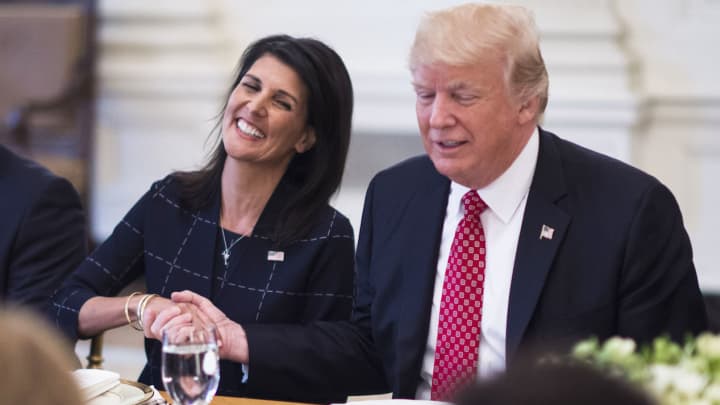
LEXINGTON, S.C. — Twenty years ago, Nikki Haley ran an upstart campaign to topple a heavily favored longtime incumbent who was a force in party politics, launching her political career and setting the stage for her gubernatorial run six years later.
But this time, voters in the district and county she represented as a state legislator don't think she's on the verge of pulling off another upset when she goes up against Donald Trump on Saturday.
Dave Mauldin, an unaffiliated voter from Lexington who is voting for Haley "just to try and screw [Trump] over," said he expects "the Trump wave is going to be like a tsunami."
More from NBC News:
Indeed, on Monday, the local GOP came out and Trump days ahead of the state's Republican primary.
"The Republicans of Lexington County made it clear that they support President Trump in the First in the South Primary and wanted to make their voices heard," Lexington County GOP Chair Mark Weber . "Our party and our committees are taking a proactive stance in tackling the issues of today, and they decided that we must coalesce behind Donald J. Trump to end the destruction of the Biden administration as soon as possible."
Clearly, a lot has changed here in the two decades since Haley unseated state Rep. Larry Koon, who at that time was the longest-serving member of the state House. Those changes mirror Trump's takeover of the GOP across the state and much of the country.
In 2016, Trump won his primary bid in Lexington County by about 6 points over Sen. Ted Cruz, R-Texas, in a more crowded field. This time around, it will be a challenge for Haley to even get close to that margin against Trump — even as the favorite daughter not only of the state but also of the county.
"There are old friends that she has in Lexington County who will turn out and remember the results that she delivered for them in the state House, both as a legislator and as governor," Rob Godfrey, a Republican strategist and former deputy chief of staff to Haley when she was governor, said. "But like in many other parts of the state that are deeply conservative, she faces a strong challenge, which is to try to peel off voters who have become comfortable voting Donald Trump for president."
Lexington County, one of the state's fastest-growing areas, has become one of the most formidable GOP strongholds in the state, regularly providing Republican candidates with large vote totals and margins of victory; in 2020, Trump bested Joe Biden here by 20 points.
It's become a county to watch on primary nights — doubly so this time around, with its close ties to Haley.
"It's an absolutely important county that has become even more important over the last few election cycles," Godfrey said, adding: "Lexington should be a part of that group of bellwether counties" across the state.
Haley's roots in the area are clear. She won her last statewide bid in Lexington County by 32 points back in the 2014 general election for governor, and a high number of her endorsers have ties to the area, including state Rep. Nathan Ballentine.
"I am expecting her to have a decent showing and a good showing," Ballentine said. "I'm not expecting her to win. But in the same vein, if I woke up tomorrow and she ended up winning that county, it wouldn't be a total surprise."
Others were less optimistic about her chances.
Moving forward, Mauldin saw Trump's literal demise as Haley's only pathway to the nomination.
"Well, you've got the cheeseburger from heaven theory," he said. "[And] if something happens with one of those trials."
In addition to how Lexington County votes, here are some other things to watch on primary night:
Polling shows Trump leading by 20-plus percentage points across the state, which includes a Tuesday showing Trump up 28 points over Haley, while a showed Trump winning by 36 points.
But there is a wild card at play that could cut into those margins: crossover voters.
Haley allies have who did not participate in the Feb. 3 Democratic primary, with appeals to vote for Haley on Saturday. to a Democratic voter who did not vote in the party's presidential primary earlier this month read: "Your vote can make a difference."
"Please participate by voting for Nikki Haley and make your voice heard," the mailer, sent by pro-Haley super PAC Stand for America Inc., continued.
What's more, the Democratic primary featured relatively low turnout, with just about 130,000 voters casting ballots — leaving plenty of voters on the table for Saturday's GOP primary. That primary is open, allowing for any registered voter to participate unless they cast a ballot in the Democratic contest this month.
While Trump , the margins were as close as they were because Haley was able to win self-identified moderate voters by more than 50 points, though Trump trounced her with conservatives. While it's essentially inconceivable that a large number of crossover voters could cut into a 30-point Trump advantage, they could make the race somewhat more interesting.
Former South Carolina Republican Party Chairman Katon Dawson, a Haley supporter, said one thing that could end up "shaking up" that Trump lead is 400,000 new people who have moved to South Carolina since the last contested GOP primary in 2016.
There is very little data on how that group votes in South Carolina, which could end up potentially providing a boost for Haley.
"That is what I am hanging my hat on," Dawson said. "That could end up shaking up that 30-point polling lead Trump keeps talking about."
In addition to Lexington County, pay close attention to the results along the coastline, from Hilton Head Island up through Myrtle Beach to the north, with Charleston and its surrounding communities in between.
These areas have some of the highest concentrations of transplant voters and encapsulate the entirety of South Carolina's most purple congressional district — represented by Rep. Nancy Mace, R-S.C., who has been vigorously campaigning for Trump in recent weeks.
If Haley is going to cut into Trump's margins, she's going to especially need to do well in the Charleston area stretching south to Beaufort and Hilton Head Island. Meanwhile, Horry County, home of Myrtle Beach, has been a source of strength for Trump in the state since his first run in 2016.
Should Trump overperform here, it would signal new strength among voters who identify as being more in the middle.
With Trump holding such a commanding lead not just in South Carolina but in most states that have been polled, the dynamics of Saturday's primary are vastly different than 2016's. But what could that mean for voter turnout?
In 2020, the South Carolina GOP canceled its primary to help Trump's re-election bid, and in 2016, nearly 740,000 people came out to vote in the GOP nominating contest.
"The 2016 number was massive. ... If turnout goes about, say, like 850,000-900,000, that would be incredible," former South Carolina GOP Executive Director Alex Stroman said.
With a contested primary in name only, turnout level this year will be a key barometer for several things, including whether Haley's attempts to court Democrats were successful.
"Can a barely contested 2024 presidential primary with a former president facing the state's popular former governor get above [2016 levels]?" he said. "I don't think it gets there, but if it does, you would have to think that substantial portion are Democrats."
He said lower turnout would likely mean that Democrats did not cross over in significant numbers, and there is also the potential some Trump voters could stay home because he is the overwhelming favorite.
"Do Trump voters think that he is up so much and [they] just don't need to vote?" Stroman said. "I don't think so, but it's a possibility."
There is also expected to be good weather for primary day, but Dawson said that can "cut both ways."
"Some people just might go fishing, I don't know?" he said. "We will know tomorrow. What I can say is low turnout is good for Donald Trump and high turnout will be good for Nikki Haley."
Dawson, the former party chair, said he will also be watching to see to what degree Trump endorsements from South Carolina Gov. Henry McMaster and South Carolina House Speaker Murrell Smith will matter.
"Those are the ones who really count," Dawson said. "McMaster is very well liked here. He is a gentleman and has said nothing disparaging about Nikki Haley, and the speaker's endorsement brought along a whole bunch of other endorsements."
Trump has a huge endorsement lead Haley's home state, and it's not clear that without them, he wouldn't still have had a lead. But Dawson said that his ability to nab McMaster and Smith was telling.
"Those are the two to watch," he said. "The others don't matter as much."




